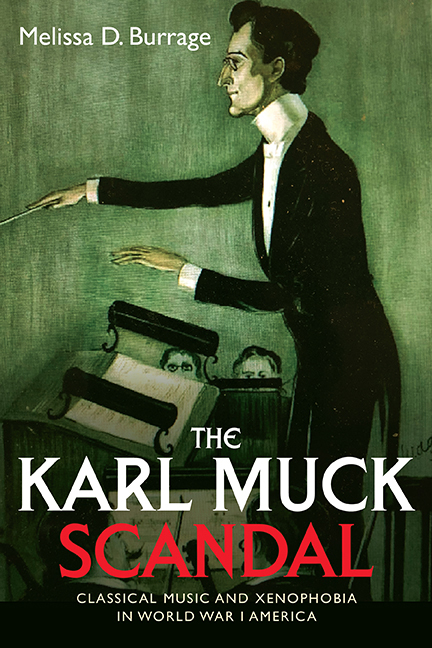Book contents
- Frontmatter
- Dedication
- Contents
- Introduction
- 1 Here on Foreign Shores: Dr. Karl Muck's Acclaim in Boston (1906–1918)
- 2 Mobilization: A Changing Environment for Boston (1917)
- 3 Selling the War: Demonizing the Enemy (1918)
- 4 “Looking for the Trump Card”: Mrs. William Jay's Attacks on Karl Muck in Wartime America (1915–1918)
- 5 “A Leaf in the Storm”: Muck, Higginson, and the Boston Symphony Orchestra (1918–1919)
- 6 Muck's Arrest: “Finding ‘One Weak Spot’” (1918–1919)
- 7 “Only Too Proud to Shoulder It All”: The Sexual Climate of Wartime Boston and Muck's Fall from Grace (1918–1919)
- 8 Muck's Final Years: His Association with the Wagners and Adolf Hitler (1920–1940)
- Coda (1919 to Present)
- Acknowledgments
- Notes
- Bibliography
- Index
- Eastman Studies in Music
6 - Muck's Arrest: “Finding ‘One Weak Spot’” (1918–1919)
Published online by Cambridge University Press: 06 September 2019
- Frontmatter
- Dedication
- Contents
- Introduction
- 1 Here on Foreign Shores: Dr. Karl Muck's Acclaim in Boston (1906–1918)
- 2 Mobilization: A Changing Environment for Boston (1917)
- 3 Selling the War: Demonizing the Enemy (1918)
- 4 “Looking for the Trump Card”: Mrs. William Jay's Attacks on Karl Muck in Wartime America (1915–1918)
- 5 “A Leaf in the Storm”: Muck, Higginson, and the Boston Symphony Orchestra (1918–1919)
- 6 Muck's Arrest: “Finding ‘One Weak Spot’” (1918–1919)
- 7 “Only Too Proud to Shoulder It All”: The Sexual Climate of Wartime Boston and Muck's Fall from Grace (1918–1919)
- 8 Muck's Final Years: His Association with the Wagners and Adolf Hitler (1920–1940)
- Coda (1919 to Present)
- Acknowledgments
- Notes
- Bibliography
- Index
- Eastman Studies in Music
Summary
Render, which are the whole art of music alike for him who prisons it in notes and staves and for him who gives it wing.
—“Dr. Muck of the Wasting Years, Yet Power of Prime,” 1926I start from the supposition that the world is topsy-turvy, that things are all wrong, that the wrong people are in jail and the wrong people are out of jail, that the wrong people are in power and the wrong people are out of power.
—Howard Zinn, 1970Muck Investigated for His Relationship with Margaret Herterb
In February of 1918, Francis Coffey, New York district attorney and regional agent for the Bureau of Investigation, sent a report to Judd Dewey, Massachusetts district attorney for Alien Matters and Boston's BOI representative, regarding the renowned Dr. Karl Muck, for his questionable relationship with Margaret Dows Herter, a twenty-twoyear- old musician from a wealthy New York family. It was Margaret's mother, Susan, who had raised concerns about Muck's conduct with her daughter. She had initially contacted the New York Police Department, and it soon became clear that this would be no ordinary complaint. The case was referred to Coffey, who opened an investigation that would ultimately lead to the downfall of the celebrated Boston Symphony Orchestra conductor.
Karl Muck's friend and colleague, Margaret Herter, was an accomplished violinist. Federal authorities brought their private relationship into the spotlight. Although the BOI found nothing illegal about the relationship, it led federal officials (and Mrs. Jay) on a quest to find other questionable relationships that Muck was involved in. The New York Sun reported that “while government officials here refused to make any statement concerning Doktor Muck's case, it was understood that much of the evidence leading to his arrest came from the little band of patriotic women in New York, led by Mrs. William Jay.”
An accusation of sexual impropriety was the latest in a series of attempts to destroy Muck's musical career in Boston and extinguish German cultural influence there by linking it to moral indecency during wartime. Before this attempt, Muck's enemies struggled to destroy him with open allegations of disloyalty. Several New York newspapers had characterized the conductor as untrustworthy and devious, claiming that he had come to America to carry out espionage efforts on behalf of Germany.
- Type
- Chapter
- Information
- The Karl Muck ScandalClassical Music and Xenophobia in World War I America, pp. 218 - 249Publisher: Boydell & BrewerPrint publication year: 2019



